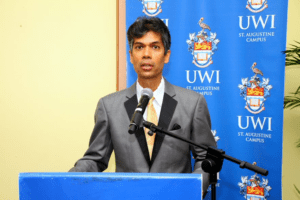
A MAJOR cause of underachievement among boys and men arises out of the culture of bullying and peer pressure.
The exposure to bullying may occur in the home, school and community. Maybe an older brother might encourage a younger brother, cousin or nephew to drop out of school or to discontinue studying and spend more time idling and in recreation.
Or fellow students in the classroom might ridicule and mock a boy for being intelligent, studious, disciplined or neat. The peer pressure or bullying would entail the use of terms as ‘nerd’, ‘sissy’, or ‘homo’ to describe boys who are ambitious, appear soft or sensitive and eager to achieve excellence.
Indeed, many teachers expect boys to not “sit still” and be more active. So, young males prefer to underachieve and be accepted by their peers. Bullies are usually at the back of the class and are noisy, disrespectful, lazy, sarcastic, frequently absent and disruptive in the classroom. Sometimes their only goal in life is restricted to being the class clown.
Teacher-student relationship is often negative. Teachers do not favour such students who lack social skills and create chaos in the classroom.

However, these male underachievers or bullies influence others in our primary and secondary schools and mask the more serious problems as mentioned earlier- the absence of a father figure at home. Often they are boys from single-parent or female-headed homes or those residing with relatives and so would not have the guidance and nurturing of proper male models to achieve or to pursue higher forms of education be it technology or academics.
This leads to an important debate- is the education system too exam-oriented? Is the learning process not geared for boys? In 2010, 2 university lecturers published their research based on 300 Malaysian schools and found that boys were emerging as underachievers in Malaysia. These findings are not limited to Malaysia but also similar to developments in Trinidad and Tobago.
Boys were being outperformed in almost all of the subjects. Girls are better suited to do homework and learn facts for exams and thus they perform better. Girls pay more attention in class and are more conscientious in studies so teachers favour them.
Boys tend to be absent more, break classes and are easily distracted by their fellow students. And, teachers are partly to blame as they do not adjust to the needs of boys and their learning styles. Because of this- boys are not doing well even in Mathematics and Science as before.
More than two decades ago, in 2000, Odette Parry, a researcher, published a work entitled Male Underachievement in High School Education. Parry used data from schools in Barbados, Jamaica, St Vincent and the Grenadines; and he highlighted the invisibility of male teachers since in the Caribbean female teachers outnumber male teachers. This is also true in T&T.
In the schools there are few male teachers as models for our boys. So, the young males in school do not have male teachers with whom to identify. Additionally, female teachers generally favour female students especially if these students are academically good in school. Some boys are attracted to
Interestingly, Parry’s data revealed that 17% of male teenagers in Jamaica responded that they preferred co-education rather than single-sex schools because they did not want to be seen as homosexual. There were lower percentages for respondents from Barbados and St. Vincent. Their self-image is more important at this stage in life than achievements.
It is almost unbelievable that a young make would prefer to attend a school with a poor academic track record and an array of discipline problems for the simple reason that he did not want to be viewed as gay!!
Some persons blame slavery or indentureship for male underachievement. This is inaccurate and merely an excuse to avoid solving this social ill. We cannot use the distant past to explain this present widespread underachievement.
The symptoms of an underachieving male society is apparent and clearly mirrored in Trinidad and Tobago. These symptoms include a rising murder rate, preponderance of males in our prisons, involvement in drug trafficking and vices as the use of legal and illegal drugs and obsession with gambling.
Dr Jerome Teelucksingh is an activist. He initiated the inaugural observances of International Day for the Elimination of Violence Against Men and Boys (January 31) and World Day of the Boy Child (May 16). He has made academic presentations at tertiary institutions including Harvard University and Oxford University.
See other articles by Dr Jerome Teelucksingh on AZP News:
A Quiet Pandemic: Male Underachievement
The Blackest Thing in Slavery wasn’t Slaves
The Importance of Emancipation Day
Tobago’s Working Class in the 1920s, 1930s
Are Humble Caring Fathers Champions?
Influencing West Indian Masculinity
Defining Caribbean Masculinity
Is Monogamy Encouraged in the Caribbean
Naps Girls: From Humble Beginnings to Excellence
US Media Creates Cultural Dependency in the Caribbean
Bloodless Revolution to Save Lives in Developing Countries
The Need for a Social and Moral Revolution
The Law of Supply and Demand in Developing Countries
End the Dependency for Developing Countries
T&T Carnival and the Emperor’s New Clothes
The Influence of Labour on Caribbean Integration
The illusion of political Unity
Presbyterians in Trinidad: Humble Missionaries, Local Workers
Religious Plurality: Curse or Blessing
Caribbean Youth Need Optimism, Patriotism
Rethinking Identities in Caribbean, Latin America
November 19: All Inclusive International Men’s Day
Should International Agencies be Blamed for Unemployment
A Need to Observe Word Unemployment Day
An Ideology for the Trade Union Movement
The Man who Couldn’t be Prime Minister
Social Outburst vs Social Revolution
Challenges of the Men’s Movement
If George Floyd was Denied Parole
The Meaning of Indian Arrival Day in T&T
International Men’s Day – A Way of Life
Wounds that cause school violence
May Day: A Time for Solidarity, Strength
Who Coined the Term ‘Black Power’
The illusion of political Unity
Presbyterians in Trinidad: Humble Missionaries, Local Workers
Religious Plurality: Curse or Blessing
Caribbean Youth Need Optimism, Patriotism
Rethinking Identities in Caribbean, Latin America
November 19: All Inclusive International Men’s Day
Should International Agencies be Blamed for Unemployment
A Need to Observe Word Unemployment Day
An Ideology for the Trade Union Movement
The Man who Couldn’t be Prime Minister
Social Outburst vs Social Revolution
Challenges of the Men’s Movement
If George Floyd was Denied Parole
The Meaning of Indian Arrival Day in T&T
International Men’s Day – A Way of Life
Wounds that cause school violence
May Day: A Time for Solidarity, Strength
Who Coined the Term ‘Black Power’
![]()












